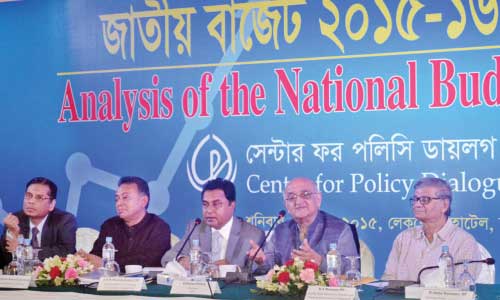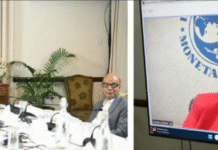The Centre for Policy Dialogue on Saturday observed that achieving the revenue collection target in the proposed budget for FY 2015-16 will be the biggest challenge for the government.
The civil society think tank came up with the observation at a dialogue titled ‘Analysis of the National Budget FY 2015-16’ arranged at a city hotel.
Planning minister AHM Mustafa Kamal, state minister for finance and planning MA Mannan, CPD chairman Rehman Sobhan and Chittagong city Bangladesh Nationalist Party president Amir Khasru Mahmud Chowdhury were present at the programme.
CPD executive director Mustafizur Rahman presented the keynote paper at the dialogue where he identified a number of challenges to implementation of the proposed budget as regards to macroeconomic context, fiscal framework, budgetary measures and reforms.
One of the major challenges of the proposed budget is the revenue collection, he said, adding that the revenue deficit in the outgoing budget is nearly Tk 30,000 crore.
The budget implementation would be disrupted if the revenue collection target fails, said the CPD executive director.
An additional investment of Tk 57,000 crore in the private sector is required to achieve the projected 7 percent GDP growth, said Prof Mustafizur. ‘Implementing annual development programme (ADP) of Tk 97,000 crore will be another big challenge for the government.’
Speaking at the programme, Rehman Sobhan mentioned that the revenue expenditure target appeared to be alright but financing of fiscal framework is somewhat questionable as financing is increasingly being dependent on the anticipation of high foreign funding.
Mustafa Kamal, the chief guest of the programme, highlighted a number of achievements of the government in formulating and implementing the budget as well as the government’s step-by-step planning regarding financing the budget.
The other major challenges as identified by the CPD were declining allocation for the social sectors, health and agriculture, lack of governance in ADP implementation, and a number of budgetary and fiscal measures related to taxation, customs and supplementary duty, private investment, incentive in power and energy, discontinued initiatives and necessary economic and institutional reforms.
Former caretaker government adviser AB Mirza Azizul Islam, Bangladesh Bank chief economist Birupaksha Paul, Bangladesh Tariff Commission chairman Azizur Rahman and BGMEA president Atiqul Islam also spoke at the programme.
The civil society think tank came up with the observation at a dialogue titled ‘Analysis of the National Budget FY 2015-16’ arranged at a city hotel.
Planning minister AHM Mustafa Kamal, state minister for finance and planning MA Mannan, CPD chairman Rehman Sobhan and Chittagong city Bangladesh Nationalist Party president Amir Khasru Mahmud Chowdhury were present at the programme.
CPD executive director Mustafizur Rahman presented the keynote paper at the dialogue where he identified a number of challenges to implementation of the proposed budget as regards to macroeconomic context, fiscal framework, budgetary measures and reforms.
One of the major challenges of the proposed budget is the revenue collection, he said, adding that the revenue deficit in the outgoing budget is nearly Tk 30,000 crore.
The budget implementation would be disrupted if the revenue collection target fails, said the CPD executive director.
An additional investment of Tk 57,000 crore in the private sector is required to achieve the projected 7 percent GDP growth, said Prof Mustafizur. ‘Implementing annual development programme (ADP) of Tk 97,000 crore will be another big challenge for the government.’
Speaking at the programme, Rehman Sobhan mentioned that the revenue expenditure target appeared to be alright but financing of fiscal framework is somewhat questionable as financing is increasingly being dependent on the anticipation of high foreign funding.
Mustafa Kamal, the chief guest of the programme, highlighted a number of achievements of the government in formulating and implementing the budget as well as the government’s step-by-step planning regarding financing the budget.
The other major challenges as identified by the CPD were declining allocation for the social sectors, health and agriculture, lack of governance in ADP implementation, and a number of budgetary and fiscal measures related to taxation, customs and supplementary duty, private investment, incentive in power and energy, discontinued initiatives and necessary economic and institutional reforms.
Former caretaker government adviser AB Mirza Azizul Islam, Bangladesh Bank chief economist Birupaksha Paul, Bangladesh Tariff Commission chairman Azizur Rahman and BGMEA president Atiqul Islam also spoke at the programme.
Source: New Age










